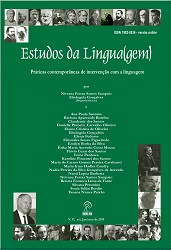"I cannot do this because i have a problem": dyslexia and the language effect of the other
DOI:
https://doi.org/10.22481/el.v17i1.5314Keywords:
Language; Writing; Dyslexia.Abstract
This paper aims to discuss questions related to the oral and written skills of a 9-year-old child with a diagnosis of dyslexia. This study is based on the interactionist perspective, which considers that there is an essential link between the acquisition of language and the process of subjectivation. In addition, child's writing data are analyzed from the point of view of Linguistics and Interactionism in Language Acquisition. Some points are considered such as: dyslexia; the relationship between the child and (oral or written) language; the inclusion of the other, the speech of the other; and the interpretation of the other as he is the one who inserts the fragments of the child into linguistic-discursive chains/situations.
Downloads
References
______.; FIAD, R. S., MAYRINK-SABINSON, M. L. Cenas de aquisição da escrita. Campinas: Mercado de Letras, 1997-2002.
BORGES, S. O quebra-cabeça: a instância da letra na aquisição da escrita. 1995. 268 f. Tese (Doutorado em Linguística) – Pontifícia Universidade Católica de São Paulo, São Paulo, 1995.
BOSCO, Z. R. A errância da letra: o nome próprio na escrita da criança. 2005. 280 f. Tese (Doutorado em Linguística) – Instituto de Estudos da Linguagem, Universidade Estadual de Campinas, Campinas, 2005.
______. No jogo dos significantes, a infância da letra. Campinas: Pontes, 2002.
CAGLIARI, L. C. Alfabetização e Linguística. São Paulo: Scipione, 1989-2003.
COUDRY, M. I. H. Diário de Narciso: Discurso e Afasia. Análise de interlocuções com afásicos. São Paulo: Martins Fontes, 1988.
______.; MAYRINK-SABINSON, M. L. Probrema e dificulidade. In: Albano, E.; Alkmin, T.; ______.; Possenti, S. (Org.). Saudades da língua: a Linguística e os 25 anos do Instituto de Estudos da Linguagem. Campinas: Mercado de Letras, 2003. p. 561-590.
DE LEMOS, C. T. Das vicissitudes da fala da criança e de sua investigação. Cadernos de Estudos Linguísticos, Campinas, v. 42, p. 41-69, 2002.
______. Língua e discurso na teorização sobre aquisição de linguagem. Letras de Hoje, Porto Alegre, v. 30, n. 4, p. 29-44,1995.
______. Native speaker’s intuitions and metalinguistic abilities: what do they have in common from the point of view of language acquisition? Cadernos de Estudos Linguísticos, v. 33, p. 41-52, 1997.
______. Sobre a aquisição da escrita: algumas questões. In: ROJO, R. H. R. Alfabetização e Linguística: perspectivas linguísticas. Campinas: Mercado de Letras, 1998. p. 13-31.
FONGARO, A. E. M. Manifestações sintomáticas na escrita e a clínica de linguagem. 100 f. Dissertação (Mestrado em Linguística) – Pontifícia Universidade Católica de São Paulo, São Paulo, 2009.
INDURSKY, F. O texto nos estudos da linguagem: especificidades e limites. In: ORLANDI, E. P.; LAGAZZI-RODRIGUES, S. Discurso e Textualidade. Campinas: Pontes, 2010. p. 33-80.
LIER-DEVITO, M. F.; ANDRADE, L. Considerações sobre a interpretação de escritas sintomáticas de crianças. Revista Estilos da Clínica, v. XIII, n. 24, p. 54-71, 2008.
______.; CARVALHO, G. Interacionismo: um esforço de teorização em Aquisição de Linguagem. In: FINGER, I.; QUADROS, R. (orgs.). Teorias de Aquisição da Linguagem. Florianópolis: Editora da UFSC, 2008, p. 115-146.
MASSI, G. et al. A dislexia em questão. São Paulo: Plexus Editora, 2007.
______. Indícios do processo de apropriação da escrita versus sintomas disléxicos. Distúrbios da Comunicação, São Paulo, v. 20, n. 3, p. 327-338, dez. 2008.
______; GREGOLIN, R. Reflexões sobre o processo de aquisição da escrita. Revista Letras, Curitiba, n. 65, , p. 153-171, jan./abr. 2005.
O QUE É DISLEXIA? Associação Brasileira de Dislexia. 19 set. 2016. Disponível em: <http://www.dislexia.org.br/o-que-e-dislexia/>. Acesso em: 11 jun. 2017.
PAIXÃO, T. N. Não consigo porque tenho um problema: reflexões sobre dislexia e aquisição da escrita. 2014. Dissertação (Mestrado em Linguística) – Programa de Pós-graduação em Linguística, Universidade Estadual do Sudoeste da Bahia, Vitória da Conquista, 2014.
PEREIRA DE CASTRO, M. F. Saussure e o necessário esquecimento da fala infantil: uma leitura para a aquisição da linguagem. Cadernos de Estudos Linguísticos, Campinas, v. 52, n. 1, 2010. p. 91-102.
______.; FIGUEIRA, R. A. Aquisição de Linguagem. In: NUNES, J. H.; PFEIFFER, C. C. Linguagem, História e Conhecimento. Campinas: Pontes, 2006. p. 73-102.
PEROTTINO, S. Sob a condição de não-falar de uma criança: a escrita de caso JM. 2009. 221 f. Tese (Doutorado em Linguística) – Instituto de Estudos da Linguagem, Universidade de Campinas, Campinas, 2009.
POMMIER, G. A história da escrita e a aprendizagem de cada criança. Tradução de Viviane Veras. In: LIER-DEVITO, M. F.; ARANTES, L. (Org.). Faces da escrita: linguagem, clínica, escola. Campinas: Mercado de Letras, 2011.
SAUSSURE, F. de. Curso de Linguística Geral. São Paulo: Cultrix, 1916-2006.
______. Escritos de Linguística Geral. São Paulo: Cultrix, 2002-2004.
Downloads
Published
How to Cite
Issue
Section
License

Estudos da Língua(gem) is licensed under a Creative Commons Attribution 4.0 International License.
Authors who publish in the journal Estudos da Língua (gem) agree with the following terms:
The journal Estudos de Língua(gem) maintains the copyrights of the contributions published. These rights include the publication of the contribution and make its content available for free through the portal.







